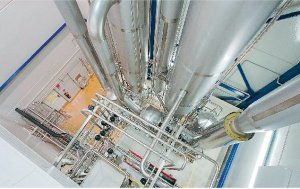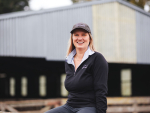The $11 million facility, funded mostly by Innovation Waikato Ltd, is the Waikato component of the Government-sponsored New Zealand Food Innovation Network.
Construction finished in late April – eight months from bare paddock to fully operational plant. It will be run by NZ Food Innovation Waikato.
“We believe this is the fastest build of its type in the world,” says plant manager, Dave Shute, whose team have spent the past month commissioning and testing. The first fresh milk was converted to powder on May 25.
The commissioning went smoothly, he says. “I’ve been working in dairy factories for 20 years and we’ve probably had the smoothest commissioning process of any factory in New Zealand. Of course, our small size had a bit to do with this.
“We will spend the next month ironing out any small glitches we’ve found and we’ll be ready to start processing our first product in July.”
Dairy Goat Co-op, Hamilton, intends using the plant and up to eight new Dairy Goat Co-op staff will work on site. The co-op needs extra capacity to meet expansion requirements.
“The Dairy Goat Cooperative’s commitment was a critical factor in creating the commercial case, and gaining government funding and approval to build the plant as a true private public partnership,” says Shute.
Dairy Goat Co-op chief executive Dave Stanley says the project is a win-win-win for those involved.
“Not only did our backing help the park get the project off the ground, it also provides Dairy Goat Cooperative with valuable extra processing capacity when our milk flow is at its peak.”
Shute says the cooperative’s commitment “gives NZ Food Innovation Waikato an excellent source of initial revenue while also allowing us the breathing space we need to get further customers on board.”
NZ Food Innovation Waikato is looking for commitments from companies that want to research and develop new spray-dried food products in the pilot plant. It is talking with specialty milk producers and companies looking to spray dry fruit and vegetable extracts.
NZ Food Innovation Waikato offers potential for specialty milk producers, in particular, to innovate. The facility suits companies ready to scale up a new spray-dried product to commercial production.
Shute says the long-term strategy for the plant is to expand the spray dryer’s capability to make infant formula.
“We receive several calls each week from companies enquiring about our ability to process infant formula. Many of these companies are exporting to China, where demand for infant formula is exploding.”
Finance for the spray dryer came from Innovation Waikato Ltd debt and a Government grant of $3.95 million. Its capacity is one-half tonne/hour, making it one of the smallest commercial spray dryers in the world.
















